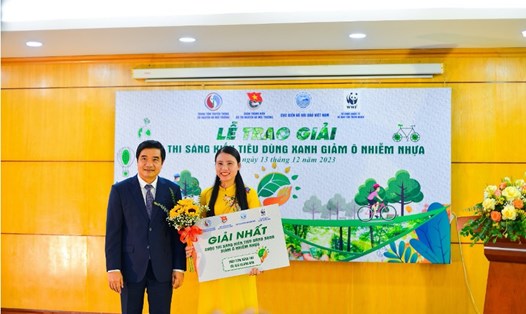Green consumption trend is penetrating families
In recent years, the kitchen of Ms. Dao Phuong Thuy (32 years old, Nam Tu Liem - Hanoi) has become much more neat when there are no more nylon bag piles after each market. Bringing fabric bags to store dry food, minimizing the use of nylon bags has become a habit of her and her family members. The very small number of nylon bags that are required to be used are not thrown away immediately, but are used many times.
"I prioritize choosing supermarkets that wrap vegetables with banana leaves and package them in paper bags. If I forget to bring my personal bag, I will re- sort it. I keep clean bags such as paper bags, clothes bags, and household items for reuse. As for dirty bags, they are used to make trash bags" - Ms. Thuy shared.
Her family also prioritizes environmentally friendly products such as stainless steel straws or glass straws instead of disposable plastic, using dishwashing provinceine instead of fabric networks, traveling with disposable bowls made from natural materials such as banyan leaves, areca molasses, etc.
Environmental pollution from plastic waste is posing serious environmental and budgetary challenges for many countries, including Vietnam. According to the Ministry of Agriculture and Environment, Vietnam generates about 1.8 million tons of plastic waste each year, of which 0.28 to 0.73 million tons are discharged into the sea. However, only about 27% of these are recycled, the rest are mainly buried or discharged into the environment. Every year, Vietnamese people use more than 30 billion nylon bags, an average of 4 nylon bags per day.
From the city to rural areas, from the mountains and forests to the ocean, plastic waste pollution is becoming a haunting "ghost", changing the living environment and natural processes, reducing the ecosystem's ability to adapt to climate change, directly threatening livelihoods and public health.
In fact, many localities currently have to use the budget to cover waste treatment costs because the current fee collection rate is not enough to cover. This goes against the principle of "polluting people must pay", increasing the burden on public finance and slowing down the implementation of sustainable development goals.
In addition to encouraging the conversion to environmentally friendly products, one of the solutions to limit plastic waste that is considered to have a current prospect is the proposal to include single-use plastic products under the special consumption tax to limit consumption.
Have strong enough sanctions to control
National Assembly delegate Nguyen Thi Le Thuy (old Ben Tre Provincial Delegation) said that the current level of nylon bag use is at an alarming level and strong policies are needed to control it. With current waste treatment technology mainly landfill, these nylon bags can only be decomposed after 100 years. On that basis, the delegate proposed expanding the tax base and applying special consumption tax on hard-to-decompose plastic packaging products.
The application of special consumption tax on plastic packaging not only saves the budget, but also regulates consumption behavior, and ensures sustainable development goals, said the delegate. According to the delegates, special consumption tax is not only about
Effective financial measures to reduce emissions, but also create motivation for businesses to invest in green technology and decomposable biological products, thereby gradually changing consumer behavior in society.
Delegate Pham Thi Thanh Mai (Hanoi Delegation) suggested that there should be a parallel between taxing and developing a roadmap to gradually eliminate nylon bags from the domestic market, so that businesses have time to adjust production and business activities.
The inclusion of single-use plastic products under the special consumption tax, if implemented with a reasonable roadmap, will be an important step in the transition to a circular economy and sustainable development.
In 2025, the Vietnamese Government aims to reduce 50% of plastic waste in the sea and ocean; 80% of tourist areas, destinations, tourist accommodation service establishments and other coastal tourism services do not use disposable plastic products and non-degradable plastic bags; ensure at least two campaigns are launched every year to collect and clean beaches nationwide; 80% of marine reserves are no longer plastic waste...











